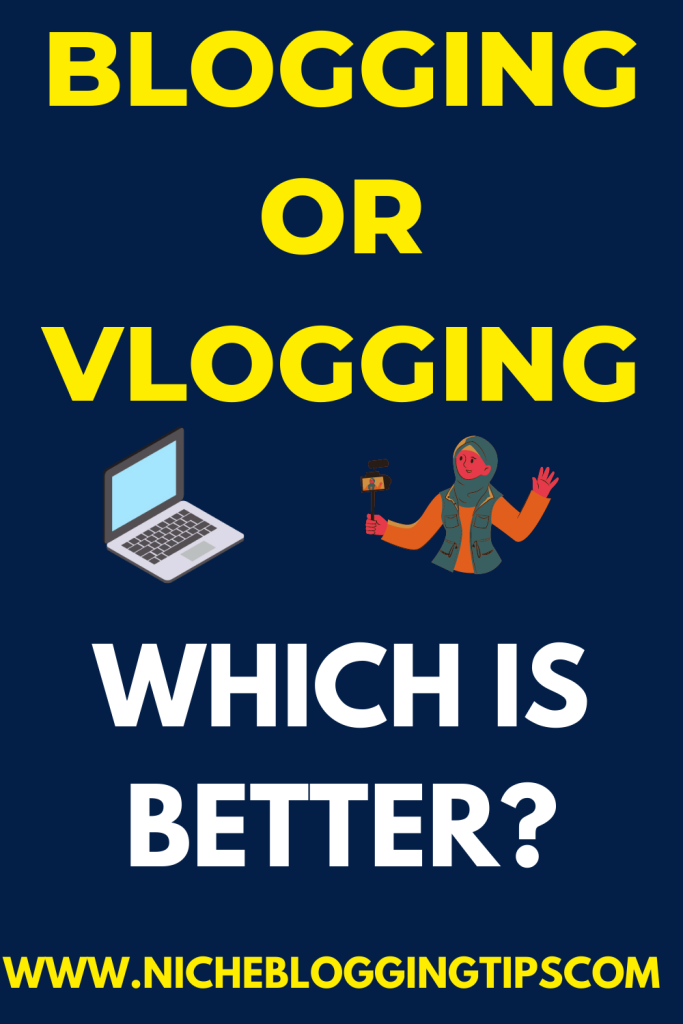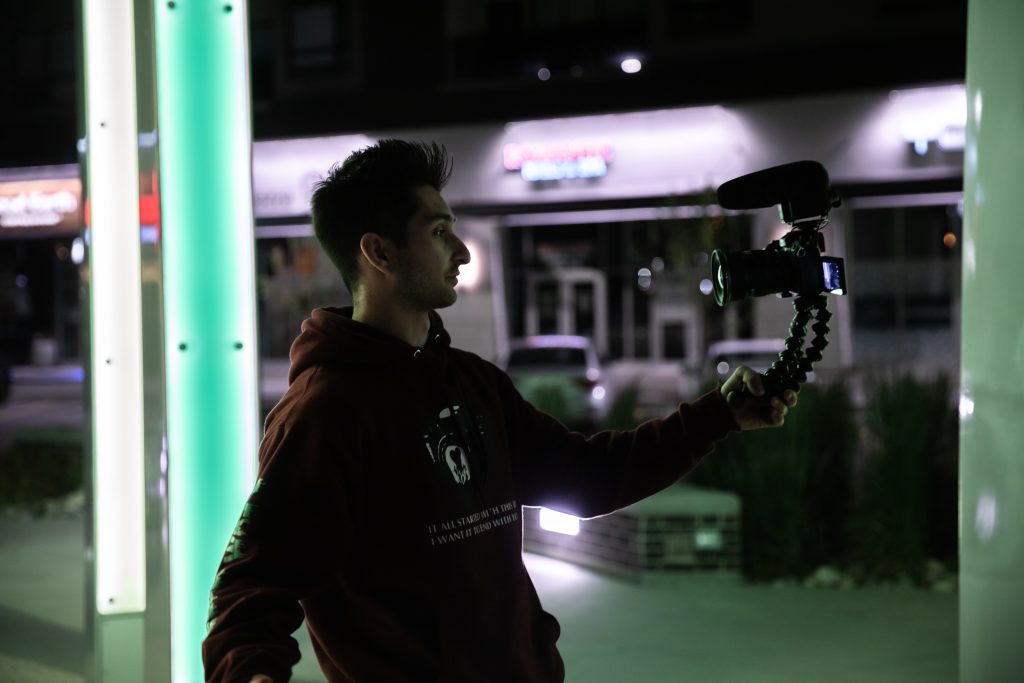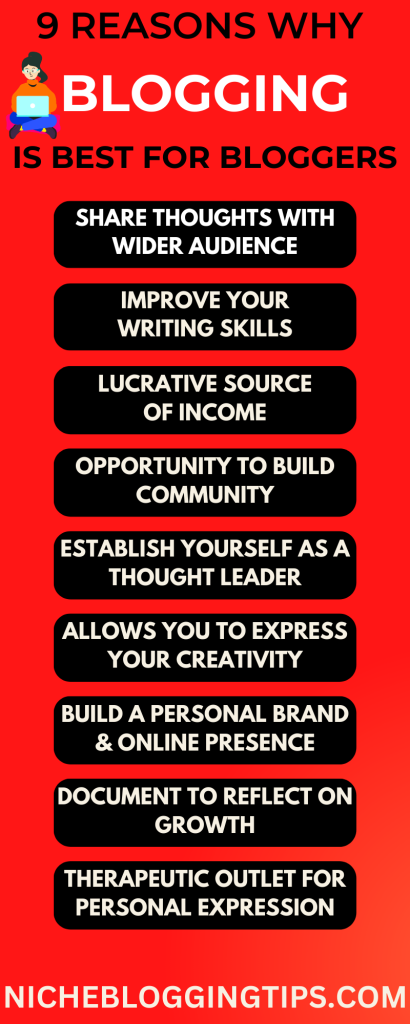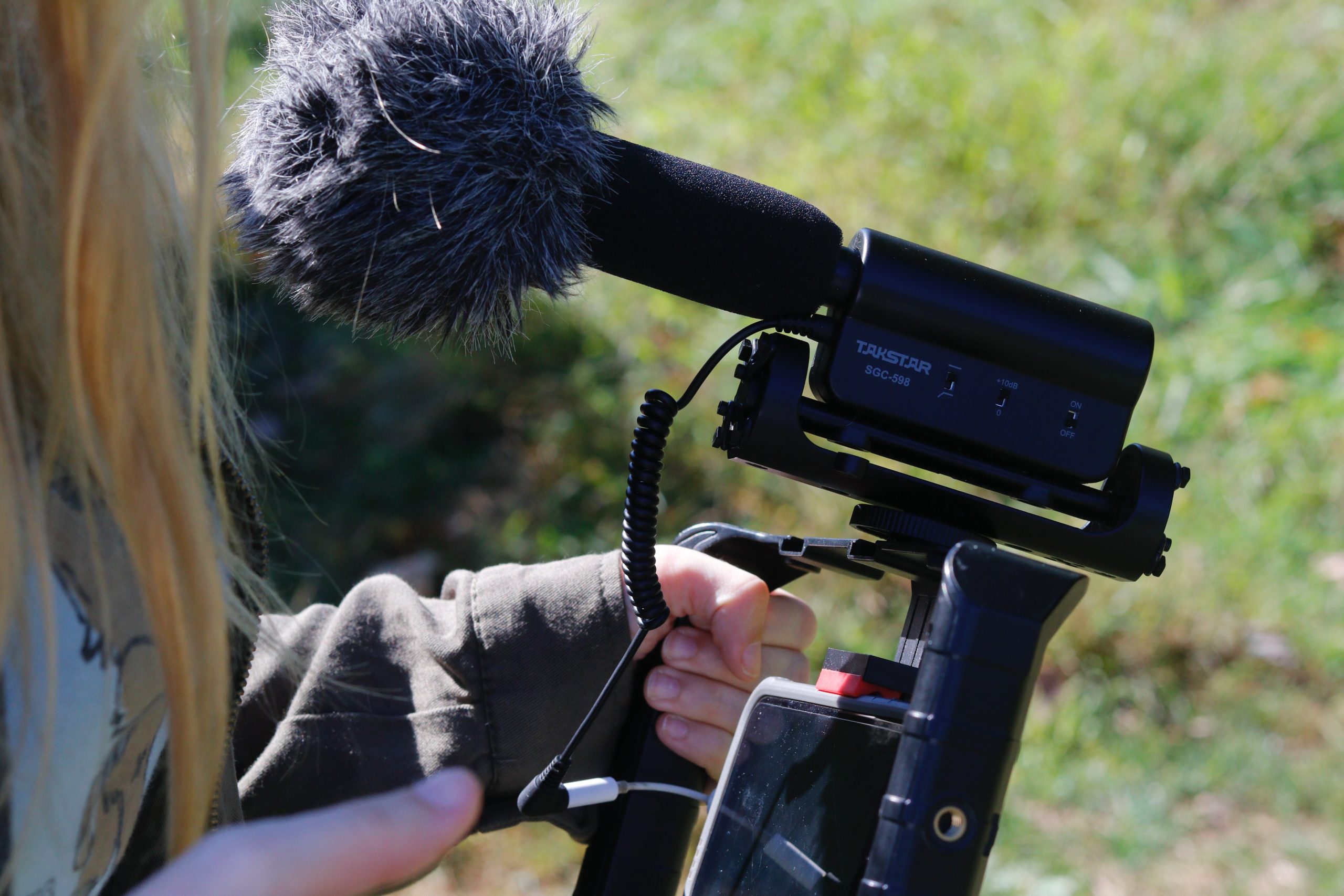Which Is Better: Blogging or Vlogging For Bloggers?

Both blogging and vlogging can be effective ways to share ideas, information, and content with an audience. The choice between blogging or vlogging often comes down to personal preference and the goals of the content creator.
Blogging involves writing and publishing written content, typically on a website or platform such as WordPress or Medium. Blogs can cover a wide range of topics and can be a useful way to share information, express opinions, and engage with readers through comments and discussion.
Vlogging involves creating and sharing video content, typically on platforms like YouTube or Vimeo. Vlogs can take many forms, from personal diaries and travel logs to educational and instructional videos.
Vlogging allows content creators to connect with their audience through visual and verbal communication and can be a powerful way to engage and connect with viewers.
Both have their own set of benefits and drawbacks, and it can be difficult to determine which is the better option for a particular blogger.
Bloggers can write about a wide range of topics, including their personal experiences, travel, food, beauty, fashion, technology, and more. Blogging allows individuals to express themselves through the written word and engage with their audience through the comments section.
Vloggers typically record themselves speaking to the camera and sharing their thoughts and experiences on a variety of topics. Vlogging allows individuals to connect with their audience in a more personal and visual way, as viewers can see and hear the vlogger directly.
So, which is better for bloggers – blogging or vlogging? Here are a few factors to consider when deciding which option is best for you:
Audience: Consider who your target audience is and which form of content they prefer. If you have a younger audience, for example, they may be more likely to engage with video content. On the other hand, if your audience is older or prefers to read, blogging may be the better option.
Time and effort: Both blogging and vlogging require time and effort to create quality content. However, vlogging may require more time and effort due to the need to plan, film, and edit videos. If you have limited time or resources, blogging may be the more practical option.
Personal style: Think about your personal style and what you enjoy doing. If you enjoy writing and expressing yourself through the written word, blogging may be the better option for you. On the other hand, if you are more comfortable speaking to the camera and enjoy creating visual content, vlogging may be a better fit.
Goals: Consider your goals for your content. If you want to monetize your content, vlogging may be a more lucrative option, as it is easier to monetize video content through ads and sponsorships. However, if your goal is simply to share your thoughts and experiences with a wide audience, either option could work.
Consider your target audience, the time and effort required, your personal style, and your goals when deciding which option is best for you. Some people may prefer to write and share written content, while others may prefer to create and share videos.
Both can be effective ways to share ideas and engage with an audience, and many content creators use a combination of both approaches.

Which Is Better For Your Audience? (Blogging Or Vlogging)

The Case For Blogging…
Blogging allows individuals and businesses to connect with their audience in a more personal and engaging way, and it offers a platform for sharing valuable content that can educate, inspire, and entertain readers.
One of the main benefits of blogging is that it allows you to share information in a more accessible and convenient way. Unlike traditional media, which may require a subscription or payment to access, blogging is typically free and easily accessible to anyone with an internet connection.
This means that your audience can access your content whenever and wherever they want, making it more convenient for them to consume and interact with it.
Another reason why blogging can be better for your audience is that it allows for more interactive and engaging content.
Blogs often include features such as comments, social media integration, and multimedia elements, which encourage readers to interact with the content and share their thoughts and opinions. This creates a sense of community and allows for a more personalized and interactive experience for your audience.
By publishing your content on a blog, it can be easily shared and distributed across the internet, reaching people who may not have otherwise come across your content.
This can be especially valuable for businesses looking to reach new customers or for individuals looking to expand their influence and impact.
In addition to the above benefits, blogging can also be a great way to build credibility and authority in your field. By consistently publishing high-quality content that addresses important issues or provides valuable insights and expertise,
You can establish yourself as a thought leader and trusted source of information that can help to build trust and credibility with your audience, which can be especially important for businesses looking to establish themselves as industry leaders.
Blogging also allows you to showcase your personality and creativity by writing in your own voice and sharing your unique perspective and experiences.
You can connect with your audience on a more personal level and differentiate yourself from other content creators which can make your content more engaging and memorable for your audience, and help to build a loyal and engaged following.
Blogging can also be a great way to generate leads and drive traffic to your website by including calls to action and links to your website or other relevant content.
You can encourage readers to take action and explore your business or offerings further. This can be especially valuable for businesses looking to grow their customer base and generate new leads.
Simply put, blogging offers a convenient and accessible platform for sharing valuable content, allows for more interactive and engaging content, reaches a wider and more diverse audience, builds credibility and authority, showcases your personality and creativity, and can generate leads and drive traffic to your website.
The Case For Vlogging…
Vlogging involves creating and uploading videos to a platform such as YouTube, typically featuring the vlogger speaking directly to the camera about their thoughts, experiences, or daily life.
There are a few key reasons why vlogging is better content for your audience than other types of content, such as written articles (blogging) or static images.
Vlogging allows for a more personal connection with the viewer for example when someone is watching a vlog, they can see the vlogger’s facial expressions and body language, which allows for a deeper understanding of their personality and perspective.
This is especially important for building trust with an audience, as it helps viewers feel like they are getting to know the vlogger on a more personal level.
Vlogging also allows for a greater level of authenticity and vulnerability. Many vloggers open up about their struggles, insecurities, and personal challenges in their videos, which can be a powerful way to connect with viewers who may be going through similar experiences.
This vulnerability helps to create a sense of community and allows viewers to feel like they are not alone in their struggles.
Another reason vlogging might be better content for your audience is that it is often more engaging and entertaining than other forms of content. When someone is watching a vlog, they are typically entertained by the vlogger’s personality and story, which makes for a more enjoyable viewing experience.
This is especially important in today’s fast-paced world, where people are constantly bombarded with content and may not have the time or attention span to read a long article.
Additionally, vlogging allows for a greater level of flexibility in terms of the types of content that can be created. While written articles are limited to their respective formats, vlogging allows for the incorporation of various elements such as music, animation, and even guest appearances. This can make for a more dynamic and visually appealing viewing experience.
One of the main benefits of vlogging is its ability to showcase a vlogger’s personality and unique perspective. Many vloggers have built large followings by sharing their passions, hobbies, and interests in their videos, which helps to create a sense of community and belonging for their viewers.
This is especially important for those who may feel isolated or disconnected from mainstream society, as it allows them to find like-minded individuals who share their passions and interests.
Finally, vlogging is often more accessible and convenient for viewers than other types of content. With the rise of smartphones and portable devices, it is easier than ever for people to access and watch vlogs on the go.
This makes it a perfect medium for busy individuals who may not have the time or inclination to sit down and read a long article.
Vlogging is a powerful and effective form of content for building a connection with your audience. Its ability to showcase the vlogger’s personality, authenticity, and unique perspective, as well as its flexibility and accessibility, make it an ideal choice for anyone looking to create engaging and meaningful content.
Whether you are looking to share your thoughts, experiences, or passions with the world, vlogging can be a fantastic way to do it.
What Makes The Most Money: Blogging Or Vlogging?

Blogging and vlogging can be a source of income for creators and the question of which one makes the most money is a common one. To answer this question, it is important to understand the differences between these two forms of content creation.
Blogging involves creating written content and publishing it on a website or a blog platform such as WordPress or Blogger. Vlogging, on the other hand, involves creating and sharing video content on platforms like YouTube or Vimeo.
In terms of revenue potential, it is difficult to determine which one makes more money as it depends on various factors such as the content, the audience, and the creator’s marketing efforts. Here are some key points to consider when comparing the earning potential of blogging and vlogging:
1. Advertisements: Both bloggers and vloggers can monetize their content through advertisements. Bloggers can display banner ads, sponsored posts, and native ads on their websites, while vloggers can include ads in their videos or display banner ads on their YouTube channels. The amount of money earned from ads depends on the traffic to the website or channel and the cost-per-click (CPC) rate of the ads.
2. Affiliate marketing: Both bloggers and vloggers can also earn money through affiliate marketing, which involves promoting products or services and earning a commission for every sale made through a unique affiliate link provided by an affiliate marketplace [*Affiliate Link]. Bloggers can include affiliate links in their blog posts or reviews, while vloggers can mention and show the products in their videos.
3. Sponsorship: Bloggers and vloggers can also earn money through sponsorships, which involve working with a company to create content that promotes their products or services. Sponsorship deals can vary in terms of the type of content, the length of the collaboration, and the payment.
4. Merchandise: Both bloggers and vloggers can also sell merchandise such as t-shirts, mugs, and hats to their audience. Vloggers may have an advantage in this area as they can show and promote the merchandise in their videos, while bloggers will have to rely on written descriptions and images.
5. Subscription: Some bloggers and vloggers offer paid subscription plans to their audience, which gives them access to exclusive content or perks. This can be a source of recurring income for the creators.
In terms of earning potential, it is difficult to say which one makes more money as it depends on the individual’s content, audience, and marketing efforts.
Both bloggers and vloggers can monetize their content through advertisements, affiliate marketing, sponsorship, merchandise, and subscription plans. It is important to note that monetizing content takes time and effort and may not be a suitable option for everyone.
It is also worth considering that both blogging and vlogging require a certain level of skill and dedication. Bloggers need to have good writing skills and be able to research and organize their ideas, while vloggers need to be comfortable in front of the camera and have basic video editing skills.
Both forms of content creation also require a consistent posting schedule and the ability to engage with the audience.
Both blogging and vlogging can be a source of income for creators, but the earning potential depends on various factors such as the content, the audience, and the creator’s marketing efforts.
How To Start Blogging On WordPress

Starting a blog can be a fun and rewarding way to share your thoughts, ideas, and experiences with the world. If you’re considering starting a blog, one popular platform to consider is WordPress.
WordPress is a content management system (CMS) that allows you to easily create and manage a blog or website. It’s user-friendly and offers a wide range of customization options, making it a great choice for beginners.
Here’s a step-by-step guide on how to start blogging on WordPress:
1. Choose a hosting provider: To start a blog on WordPress, you’ll need to have a hosting provider that will store your website’s files and make them accessible to visitors. There are many hosting providers to choose from, including Siteground, Bluehost, and HostGator [*Affiliate Links]. Some hosting providers offer a free domain name and a one-click WordPress installation, which can make the setup process easier.
2. Install WordPress: Once you have a hosting provider, you’ll need to install WordPress. This can typically be done through your hosting provider’s control panel. Some hosting providers offer a one-click installation option, while others may require you to download the WordPress files and upload them to your hosting account manually.
3. Choose a theme: WordPress offers a wide range of free and premium themes [*Affiliate Link] that allow you to customize the look and feel of your blog. To choose a theme, log in to your WordPress dashboard and go to the “Appearance” section. From there, you can browse through the available themes and preview how they will look on your blog.
4. Customize your blog: Once you’ve chosen a theme, you can start customizing your blog to make it your own. This can include adding widgets to the sidebar, creating custom menus, and adding custom pages. You can also customize the appearance of your blog by adding a logo, changing the color scheme, and adding custom fonts.
5. Create your first post: To create a new post, go to the “Posts” section of your WordPress dashboard and click on “Add New.” From there, you can enter your post title and content, add images or videos, and choose a featured image that will be displayed on the homepage of your blog.
6. Promote your blog: Once you have a few posts published, it’s time to start promoting your blog. This can include sharing your blog on social media, participating in online communities related to your blog’s topic, and guest posting on other blogs. You can also consider using paid advertising options, such as Google AdWords or Facebook Ads, to reach a larger audience.
7. Make money from your blog: If you’re looking to monetize your blog, there are several options to consider. You can sell advertising space on your blog, offer sponsored content, or use affiliate marketing to earn a commission from sales made through your blog. You can also sell products or services related to your blog’s topic, such as ebooks or online courses.
Blogging on WordPress can be a fun and rewarding way to share your thoughts and ideas with the world. By following these steps, you can easily set up and manage your own WordPress blog.
How To Start Vlogging And Why YouTube Is Best

Vlogging, or video blogging, has become a popular way for individuals to share their lives, experiences, and passions with the world. Many people are now wondering how to start vlogging, and YouTube is often considered the best platform for it.
Before diving into the specifics of how to start vlogging on YouTube, it’s important to understand why YouTube is considered the best platform for it.
1. YouTube has the largest audience of any video-sharing platform. With over 2 billion users, YouTube is the go-to destination for people looking to watch and share videos. This means that your vlogs have the potential to reach a large and diverse audience.
2. YouTube offers a range of tools and features to help vloggers succeed. These include analytics to track the performance of your videos, the ability to monetize your videos through ads and sponsorships, and the ability to collaborate with other creators through YouTube’s Creator Collaboration Program.
3. YouTube has a strong community of creators and enthusiasts. There are many vloggers on YouTube who are happy to offer advice and support to new creators. This can be especially helpful for those who are just starting out and may not have a lot of experience in video production.
Now that you understand why YouTube is the best platform for vlogging, let’s dive into the steps you need to take to start vlogging on YouTube:
1. Create a YouTube account. To start vlogging on YouTube, you’ll need to create a YouTube account. This is a simple process that involves providing your name, and email address, and creating a password.
2. Choose a channel name. Your channel name is the name that will appear on your YouTube channel page. Choose a name that reflects your brand or the theme of your vlogs. For example, if you’re vlogging about your travels, you might choose a channel name like “Adventure Vlogs.”
3. Customize your channel. Once you’ve created your channel, you can customize it by adding a profile picture and a channel banner. These are important for helping to establish your brand and make your channel stand out.
4. Determine the focus of your vlogs. Before you start vlogging, it’s important to determine the focus of your vlogs. This will help you create a consistent theme and give your viewers a clear idea of what to expect from your videos. Some common vlogging topics include travel, food, lifestyle, and personal development.
5. Invest in the right equipment. To create high-quality vlogs, you’ll need to invest in the right equipment. This includes a good camera, lighting equipment, and a microphone. While you can start with a smartphone camera, you may want to consider investing in a dedicated camera as you grow your channel.
6. Edit your videos. Editing your vlogs is an important step in the process of creating high-quality content. There is a range of software programs that you can use to edit your videos, including Adobe Premiere Pro, Final Cut Pro, and iMovie.
7. Optimize your titles and descriptions. To get your vlogs seen by more people, it’s important to optimize your titles and descriptions. This means including relevant keywords and using catchy, descriptive titles that will grab people’s attention.
8. Engage with your audience. Building a community of followers is an important part of vlogging on YouTube. Engage with your viewers by responding to comments, asking for feedback, and encouraging them.
Advantages Of Blogging Over Vlogging

Blogging and vlogging are two popular methods of sharing content online, but each has its own advantages and disadvantages. While vlogging, or video blogging, has gained popularity in recent years thanks to platforms like YouTube, blogging still holds its own as a more versatile and effective way to share information.
Here are some of the advantages of blogging over vlogging:
SEO benefits: Search engine optimization (SEO) is crucial for any online content, as it determines how easily it can be found through search engines like Google. Blogging offers numerous SEO benefits, as it allows you to include keywords, tags, and descriptions that help search engines understand the content of your post. Vlogging, on the other hand, relies more on visual elements, which can be less effective for SEO.
Longer shelf life: Vlogs often have a shorter shelf life than blog posts, as they tend to focus on timely topics or events. Blog posts, on the other hand, can remain relevant and useful long after they are published. This is especially true for informational or educational content, which can continue to be valuable to readers for years to come.
Easy to share: Blogging is also easier to share than vlogging, as it allows readers to easily copy and paste links to share with others. Vlogs, on the other hand, require the viewer to watch the entire video in order to consume the content, which may not always be convenient or possible.
Greater accessibility: Blogging is more accessible to a wider audience than vlogging, as it can be easily translated into different languages and accessed on a variety of devices. Vlogs, on the other hand, are often limited to the language in which they were filmed and may not be easily viewable on certain devices.
More detailed information: Blogging allows for more detailed and in-depth information to be shared, as it allows for longer written pieces with the ability to include images, videos, and other multimedia. Vlogging, on the other hand, is often limited to the time frame of the video, which may not allow for as much information to be shared.
Greater control over content: Blogging also gives you greater control over your content, as you can easily edit and update your posts as needed. Vlogs, on the other hand, are more difficult to revise once they are published, and any mistakes or incorrect information may remain in the video indefinitely.
Lower production costs: Blogging requires fewer resources and lower production costs than vlogging, as it only requires a computer and internet connection. Vlogging, on the other hand, requires more expensive equipment like cameras, microphones, and lighting, which can be a significant investment for those just starting out.
While vlogging can be a fun and engaging way to share content, blogging offers numerous advantages that make it a more effective and versatile option for sharing information online.
Whether you are looking to share educational content, promote a business, or simply share your thoughts and experiences with others, blogging is a powerful tool that you can consider over vlogging.
Disadvantages Of Blogging Over Vlogging

While both blogging and vlogging have their own set of advantages, there are also some significant disadvantages to consider when choosing which one to focus on.
Here are some of the main drawbacks of blogging over vlogging:
1. Less Engaging
One of the biggest drawbacks of blogging is that it is less engaging than vlogging. While written content can be informative and entertaining, it can’t match the visual and audio appeal of a vlog. Videos are more attention-grabbing and can easily hold a viewer’s interest for longer periods of time.
2. Harder to Monetize
Another disadvantage of blogging is that it can be harder to monetize compared to vlogging. While there are a variety of ways to make money from a blog, these methods can take time and effort to set up and may not always be reliable sources of income.
3. Requires More Time and Effort
Blogging also requires more time and effort compared to vlogging. Creating written content can be time-consuming, especially if you are writing long-form articles or researching topics for your blog. In contrast, vlogging is generally faster and easier as it involves simply filming and editing a video. This is especially true for those who are more comfortable in front of the camera and don’t mind speaking on camera.
4. Limited to Written Content
Blogging is also limited to written content, which can be a disadvantage for those who prefer to express themselves through other mediums such as art, music, or video. Vlogging, on the other hand, allows for a greater range of creative expression through the use of visual and audio elements. This can make vlogging a more appealing platform for those who want to showcase their talents and passions in a more engaging way.
5. Harder to Stand Out
Another disadvantage of blogging is that it can be harder to stand out in a crowded space. With so many bloggers out there, it can be tough to get noticed and attract a large following. This is especially true if you are just starting out and don’t have a well-established brand or following. Vlogging, on the other hand, can be more effective at getting noticed due to the visual and audio appeal of videos.
While blogging has its own set of advantages, it also has several disadvantages compared to vlogging. These include being less engaging, harder to monetize, requiring more time and effort, being limited to written content, and being harder to stand out in a crowded space.
If you are considering starting a content creation platform, it’s important to weigh the pros and cons of both blogging and vlogging before making a decision.
Benefits Of Vlogging Over Blogging

While blogging has its own set of benefits, there are several reasons why vlogging may be a more effective way to connect with an audience and build a following.
One of the biggest benefits of vlogging is the ability to connect with your audience on a deeper level. When you’re on camera, you’re able to show your personality and emotions in a way that written words simply cannot.
This allows your viewers to get a better sense of who you are and what you stand for, which can help build trust and authenticity.
Another advantage of vlogging is the power of visual storytelling. While a blog post can be informative and engaging, adding video to your content can bring your message to life in a way that words alone cannot.
Whether you’re demonstrating a product, showing off a new location, or simply sharing your thoughts and experiences, video allows you to connect with your audience in a more dynamic and engaging way.
In addition, vlogging allows for more flexibility and creativity in your content. While a blog post is typically a linear format, a vlog can include a variety of different elements such as music, graphics, and even animation to help bring your message to life.
This can make your content more interesting and engaging for your viewers, which can help increase your chances of building a loyal following.
Another benefit of vlogging is the potential for increased reach and visibility. With the rise of platforms like YouTube and Instagram, it’s easier than ever to share your videos with a large audience.
Additionally, video content tends to perform well on social media, meaning that your vlogs are more likely to be shared and seen by a wider audience.
Vlogging can be a more interactive and personal way to connect with your audience. Through the use of comments and live streams, you can engage with your viewers in real time, allowing you to build a strong community of loyal followers.
Vlogging offers a unique set of benefits that can help you connect with your audience on a deeper level and build a loyal following. Whether you’re sharing your passions, showcasing your skills, or simply sharing your thoughts and experiences, vlogging allows you to do so in a more dynamic and engaging way.
Drawbacks Of Vlogging Over Blogging

Vlogging can be an enjoyable and potentially lucrative way to communicate with others, but there are several drawbacks to consider before diving into this form of content creation.
One major drawback of vlogging is the time and effort required to produce high-quality videos. Unlike blogging, which can be done quickly and easily with just a few clicks of a keyboard, vlogging requires a lot of planning, filming, and editing.
This can be particularly challenging for those who are not tech-savvy or who do not have access to professional equipment and software. Even with the right tools, creating a vlog can take several hours, or even days, depending on the length and complexity of the content.
Another drawback of vlogging is the potential for privacy violations. While blogs can be written anonymously or with limited personal information, vloggers often reveal their faces and other identifying details in their videos.
This can lead to unwanted attention from strangers or even stalkers, which can be a major concern for those who value their privacy. Additionally, vloggers may be hesitant to share certain aspects of their lives on camera for fear of being judged or criticized by their audience.
Vlogging can also be more stressful than blogging, as there is less room for error. While bloggers can easily edit and revise their written content, vloggers must be more careful about what they say and do on camera.
A single misstep or awkward moment can be captured and shared online, leading to potentially embarrassing consequences. This added pressure can make vlogging less enjoyable and more intimidating for those who are not comfortable in front of the camera.
While blogs can be easily shared and shared via social media and other online platforms, vlogs may not be as easily accessible to those who do not use video-sharing sites like YouTube.
Additionally, the sheer number of vlogs available online can make it difficult for individual vloggers to stand out and attract a large following. This can be frustrating for those who are trying to grow their vlogging business or gain more exposure.
While vlogging can be a fun and rewarding way to share content with others, it is important to be aware of the drawbacks that come with this form of content creation. From the time and effort required to the potential for privacy violations and stress, vlogging may not be the right choice for everyone.
If you are considering starting a vlog, it is important to carefully weigh the pros and cons and be prepared for the challenges that may arise.
Should You Choose Blogging Or Vlogging (Which One)?

Blogging and vlogging have become popular ways for bloggers and almost any type of content creator to share their expertise with a diverse audience. These forms of content creation have the potential to reach a large number of people and can be a powerful tool for communication and marketing.
One of the key advantages of blogging or vlogging is the ability to connect with an audience in a more personal and authentic way. This can be especially valuable for businesses, as it can help to establish a loyal customer base and differentiate you from competitors.
Both can also be effective for driving traffic to your website or social media channels. By consistently creating high-quality content, you can increase your visibility online and attract more visitors to your site. This can be particularly valuable for businesses, as it can lead to increased sales and revenue.
Another benefit of blogging and vlogging is the sharing of insights on a particular topic as you can establish yourself as an expert and trusted source of information in your niche.
This can be especially valuable for professionals looking to build their personal brand or for businesses looking to establish themselves as industry leaders.
Also note that whether you are a writer, photographer, or videographer, these forms of content creation can be an outlet for your creativity and allow you to share your unique perspective with others.
Whether you are an individual looking to share your thoughts and experiences or a business looking to reach a wider audience and drive traffic to your website, these forms of content creation can be a powerful tool for communication and marketing.
By consistently creating high-quality content, you can build relationships with your audience, showcase your expertise, and express your creativity, all while increasing your visibility online. So, it can be a great way to reach out to the audience and showcase your skills.

FAQs Of “Which Is Better: Blogging Or Vlogging?”
What are the main differences between blogging and vlogging?
Blogging typically involves writing and publishing written content, often in the form of articles or posts, on a website or platform. Vlogging, on the other hand, involves creating and sharing video content, usually on a YouTube channel or other video-sharing platform.
What are the advantages and disadvantages of blogging?
One advantage of blogging is that it allows for more in-depth, detailed content. Blogs also tend to be more search engine friendly, which can help drive traffic to your website. On the other hand, blogging can be time-consuming and may require more planning and organization than vlogging.
What are the advantages and disadvantages of vlogging?
Vlogging can be a more engaging and visually appealing way to share content. It can also be easier and quicker to create a vlog compared to writing a blog post. However, vlogging can require more technical skills and equipment, and it may not be as easy to convey complex ideas or detailed information through a video format.
Which is more suitable for a beginner: blogging or vlogging?
Both blogging and vlogging can be suitable for beginners, depending on your interests and strengths. If you enjoy writing and are comfortable with the written word, blogging may be a good option. If you are more comfortable speaking on camera and have the technical skills and equipment, vlogging may be a better choice.
What are the potential earning opportunities for bloggers and vloggers?
Both bloggers and vloggers can potentially earn money through advertising, sponsorships, and affiliate marketing. However, the earning potential for each can vary significantly depending on the size of your audience and the quality of your content.
What are the time commitments for blogging and vlogging?
The time commitment for both blogging and vlogging can vary depending on your goals and how frequently you publish new content. Blogging may require more planning and research, as well as writing and editing time, while vlogging may require more time for filming and editing video content.
Which is more suitable for building a personal brand: blogging or vlogging?
Both blogging and vlogging can be effective ways to build a personal brand. If you have a strong writing voice and are comfortable sharing your thoughts and experiences through writing, blogging can be a good option. If you are more comfortable sharing your personality and storytelling through video, vlogging may be a better choice.
What are the technical requirements for blogging and vlogging?
To start a blog, you will need a website and a content management system (CMS) such as WordPress. You may also need a domain name and hosting. Vlogging requires a camera and microphone, as well as video editing software. You will also need to create a YouTube channel or use another video-sharing platform.
How can I grow my audience as a blogger or vlogger?
There are several strategies you can use to grow your audience as a blogger or vlogger, such as creating high-quality, valuable content, promoting your content through social media and other channels, collaborating with other creators, and using search engine optimization (SEO) techniques.
Can I do both blogging and vlogging?
Yes, you can definitely do both blogging and vlogging! Some creators choose to combine written and video content to create a more well-rounded and diverse presence online. Just be aware that both types of content creation require time and effort, so it’s important to manage your workload and prioritize your goals.
Check Out This Helpful Content:
Blogging For Entrepreneurs: Best Entrepreneur Blogs To Read [Article]
What Is A Blog? (Differences And Comparisons To A Website) [Article]
WordPress.com VS WordPress.org Self Hosted Or Free (Which Is Better?) [Article]
21+ Blogging Tips For Beginners (Beginner Blogger Mistakes) [Article]
Why Blogging Is Important For Business And Marketing [Article]
Niche Blogging: How To Start A Niche Blog (Easy Tips & Benefits) [Article]
Best Niches For Blogging With Low Competition [Article]
Niche Blogging Ideas For A Beginner Blogger (5 Popular Niches) [Article]
What Is Niche Blogging? [Article]
What Are The Most Profitable Blog Niches? [Article]
What Are The Best Niches To Start Blogging? [Article]
How To Find Blogging Niches And More [Article]
*NOTE: a few of the links on this page are affiliate links and will earn us a small commission if you signup for the services. This adds no cost to you but helps keep Niche Blogging Tips sustainable. It’s also worth noting that some of the resources mentioned on this page are products that I’m signed up for, paid for, and a regular user of.






